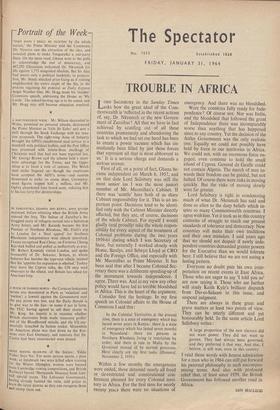TROUBLE IN AFRICA
LORD SALISBURY in the Sunday Times • asks how the great ideal of the Com- monwealth is 'reflected in the recent actions of, say, Dr. Nkrumah or the new Govern- ment of Zanzibar? All that we have in fact achieved by scuttling out - of all these countries prematurely and abandoning the task to which we had set our hand has been to create a power vacuum which has im- mediately been filled by just those forces that represent all that is most abhorrent to us.' it is a serious charge and demands a serious answer.
First of all, on a point of fact, Ghana be- came independent on March 6, 1957, and on that date Lord Salisbury was still the most senior (as I was the most junior) member of Mr. Macmillan's Cabinet. If there was 'scuttle' here both of us share Cabinet responsibility for it. This is an ini- portant point. Decisions tend to be identi- fied only with the Cabinet Minister directly affected, but they are, of course, decisions of the whole Cabinet. For myself I would gladly (and proudly) take the whole respon- sibility for every aspect of the treatment of Colonial problems during the two years 1959-61 during which I was Secretary of State, but naturally I worked closely with Home, Sandys, and Selwyn Lloyd at CRO and the Foreign Office, and especially with Mr. Macmillan as Prime Minister. It has been said that after I became Colonial Sec- retary there was a deliberate speeding-up of • the movement towards independence. I agree. There was. And in my view any other policy would have led to terrible bloodshed in Africa. This is the heart of the argument. Consider first the heritage. In my first speech on Colonial affairs to the House of Commons I said this : In the Colonial Territories at the present time, there is a state of emergency which has lasted seven years in Kenya: there is a state of emergency which has lasted seven months in Nyasaland : there are persons in Northern Rhodesia living in restriction by order; and there is rule in Malta by the Governor instead of by normal processes. Here clearly are my first tasks. (Hansard, November 2, 1959.) Within a few months the emergencies were ended, those detained nearly all freed or de-restricted and constitutional con- ferences planned for every Colonial terri- tory in Africa. For the first time for nearly twenty years there were no situations of emergency. And there was no bloodshed.
Were the countries fully ready for Inde- pendence? Of course not. Nor was India, and the bloodshed that followed the grant of Independence there was incomparably worse than anything that has happened since to any country. Yet the decision of the Attlee Government was the only realistic one. Equally, we could not possibly have held by force to our territories in Africa. We could not, with an enormous force en- gaged, even continue to hold the small island of Cyprus. General de Gaulle could not contain Algeria. The march of men to- wards their freedom can be guided, but not halted. Of course there were risks in moving quickly. But the risks of moving slowly were far greater.
Lord Salisbury is right in condemning much of what Dr. Nkrumah has said and done as alien to the deep beliefs which in- spire so many Commonwealth countries. I agree with him. Yet it took us in this country centuries of struggle to reach our present standards of tolerance and democracy. New countries will make their own traditions and their own mistakes. I said years ago that we should not despair if newly inde- pendent countries demanded greater powers for the Executive than we would tolerate here. I still believe that we are not seeing a lasting pattern.
Everyone no doubt puts his own inter- pretation on recent events in East Africa. Those who are eager to say 'I told you so' are now saying it. Those who see further will study Keith Kyle's brilliant dispatch from Dar-es-Salaam in this issue, and suspend judgment.
There are always in these great and grave matters at least two points of view. They can be utterly different and yet honourably held. In the same article Lord Salisbury writes :
A large proportion of the new electors did not want power. They did not want to govern. They had always been governed, and they preferred it that way. And that, I believe, is still true, even in this country.
I read those words with honest admiration for a man who in 1964 can still put forward his paternal philosophy in such uncompro- mising terms. And also with profound relief that, at least since 1959, the British Government has followed another road in Africa.
IAIN MACLEOD






































 Previous page
Previous page